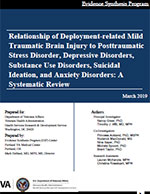
Prepared by:
Evidence-based Synthesis Program (ESP) Center, Minneapolis VA Health Care System Minneapolis, MN
Timothy J. Wilt, MD, MPH, Director
Recommended citation:
Greer N, Ackland P, Sayer N, Spoont M, Taylor B, MacDonald R, McKenzie L, Rosebush C, Wilt TJ. Relationship of Deployment-related Mild Traumatic Brain Injury to Posttraumatic Stress Disorder, Depressive Disorders, Substance Use Disorders, Suicidal Ideation, and Anxiety Disorders: A Systematic Review. Washington, DC: Evidence Synthesis Program, Health Services Research and Development Service, Office of Research and Development, Department of Veterans Affairs. VA ESP Project #09-009; 2019.
Download PDF: Complete Report, Executive Summary, Report, Appendices
More than 2 million United States (US) service members have deployed to Iraq and Afghanistan in support of Operations Enduring Freedom (OEF), Iraqi Freedom (OIF), and New Dawn (OND) since September 11, 2001. Approximately 10% of active duty service members deployed to Iraq and Afghanistan between 2003 and 2014 received a new TBI diagnosis within 3 years after returning from these deployments. The US Department of Defense (DoD) reported a total of 379,519 first-time traumatic brain injuries (TBIs) world-wide from 2000 to 2017 with 312,495 (82%) classified as mild (mTBI). Within the Veterans Health Administration (VHA), between the start of required screening for TBI in 2007 through September 2016, 1,066,474 Veterans were screened, 201,997 screened positive, and 147,744 completed the VA Comprehensive TBI Evaluation. There were 83,318 confirmed TBI diagnoses, mostly mTBI.
OEF/OIF/OND service members and Veterans are also at increased risk for psychiatric conditions including posttraumatic stress disorder (PTSD), depressive disorders, substance use disorders, suicidal ideation or attempts, and anxiety disorders. It is unknown, however, whether these psychiatric conditions are more common in OEF/OIF/OND service members and Veterans with a deployment-related TBI than among those without TBI. Evidence for whether the rates of these psychiatric comorbidities are comparable among deployed service members and Veterans who incurred a TBI versus those who did not is critical to inform policy, programming, and treatment decisions involving those with TBI. Moreover, clinicians need to know the effectiveness and safety of evidence-based mental health treatments in service members and Veterans who also have a history of TBI. This report focuses on the prevalence of psychiatric conditions and the effectiveness of mental health interventions in service members and Veterans with a history of deployment-related mTBI.
Key Question 1a. Is the prevalence of psychiatric conditions (posttraumatic stress disorder [PTSD], depressive disorders, substance use disorders, suicidal ideation or attempts, and anxiety disorders) different in service members and Veterans with and without deployment-related mild traumatic brain injury (mTBI) (one or more)?
Key Question 1b. How do severity and persistence of psychiatric conditions (PTSD, depressive disorders, substance use disorders, suicidal ideation or attempts, and anxiety disorders) differ in service members and Veterans with and without deployment-related mTBI?
Key Question 2. What are the effectiveness and comparative effectiveness and harms of interventions for treatment of PTSD, depressive disorders, substance use disorders, suicidal ideation or attempts, and anxiety disorders in service members and Veterans with history of deployment-related mTBI?
Relationship of Deployment-related Mild TBI to Psychiatric Conditions - Management Brief
Systematic Review: Relationship of mTBI to PTSD, Depression, Substance Abuse, Suicidal Ideation, and Anxiety Disorders (Cyberseminar)
Greer N, Sayer N, Spoont M, et al. Prevalence and severity of psychiatric disorders and suicidal behavior in service members and veterans with and without traumatic brain injury. Journal of Head Trauma Rehabilitation. Published online April 25, 2019. doi: 10.1097/HTR.0000000000000478.
Ackland PE, Greer N, Sayer NA, Spoont MR, Taylor B, MacDonald R, McKenzie L, Rosebush C, Wilt TJ. Effectiveness and Harms of Mental Health Treatments in Service Members and Veterans with Mild Traumatic Brain Injury: A Systematic Review. Journal of Affective Disorders. 2019;1(252):493-501. https://doi.org/10.1016/j.jad.2019.04.066